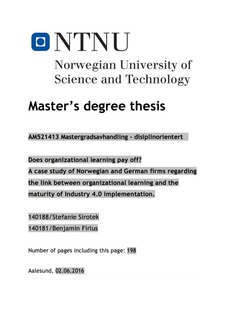| dc.contributor.advisor | Solli-Sæther, Hans | |
| dc.contributor.advisor | Schlingloff, André | |
| dc.contributor.author | Sirotek, Stefanie | |
| dc.contributor.author | Firlus, Benjamin Hans | |
| dc.date.accessioned | 2016-10-27T12:30:23Z | |
| dc.date.available | 2016-10-27T12:30:23Z | |
| dc.date.issued | 2016 | |
| dc.identifier.uri | http://hdl.handle.net/11250/2417967 | |
| dc.description.abstract | The fourth Industrial Revolution (Industry 4.0), which currently is the most important process innovation, is of high relevance for Norway and Germany. For the Norwegian economy, which has been facing deindustrialization, Industry 4.0 constitutes the opportunity to develop a desperately needed additional economic pillar (besides the gas and oil industry). Also for the German economy which has been untroubled by deindustrialization, the Industry 4.0 concept is vital. It allows to upgrade the industry to the next level and enables Germany to maintain internationally competitive. Thus, firms in both nations benefit from a prompt implementation of the concept. | nb_NO |
| dc.description.abstract | However, despite the importance of Industry 4.0, little is known about the circumstances within the firm that foster the implementation of Industry 4.0. The present thesis investigates the link between organizational learning and the maturity of Industry 4.0 implementation in Norwegian (Ekornes ASA) and German (Mangelberger GmbH and Siemens Elektronikwerk Amberg AG) firms. In order to shed light on this link, a case study research strategy which allows in-depth insight, is utilized. | nb_NO |
| dc.description.abstract | The aim of the thesis/case study is to answer the following research questions: How does the fulfilment of indicators of good organizational learning impact the maturity of Industry 4.0 implementation within the firm? Why does the fulfilment of indicators of good organizational learning impact the maturity of Industry 4.0 implementation within the firm? | nb_NO |
| dc.description.abstract | In order to provide satisfying answers to the research questions, the representatives of the firms were interviewed and questionnaires were applied. To validate the findings, the representatives were asked to do a self assessment. Furthermore, companies were visited to get detailed insights and to form a clear picture of the actual processes. | nb_NO |
| dc.description.abstract | The first research question is answered as follows. It is proposed that the fulfilment of indicators of good organizational learning leads to a high level of Industry 4.0 implementation. Mangelberger GmbH and Siemens Elektronikwerk Amberg AG were found to have a very high level of organizational learning and a high level of Industry 4.0 implementation. However, Ekornes which has a lower level of organizational learning also possesses a lower Industry 4.0 implementation level. Furthermore, Ekornes, Mangelberger and Siemens especially emphasize certain focus areas in the context of the implementation of Industry 4.0. The focus area highlighted by all three companies are: Dealing with mistakes, overall picture, communication within the firm and management of skills. Mangelberger and Siemens which have a higher Industry 4.0 implementation level underscore four additional focus areas. Those focus areas are employees and learning, resources for learning, feedback culture and customer view. Thus, it is proposed that good performance in the focus areas dealing with mistakes, employees and learning, resources for learning, feedback culture, overall picture, communication within the firm, management of skills and customer view is of high importance for the Implementation of Industry 4.0. | nb_NO |
| dc.description.abstract | Regarding the second research question it is revealed that organizational culture has an important role. It is proposed that firms which possess a certain level of organizational learning are likely to have an organizational culture that fosters innovation. Indicators and focus areas of good organizational learning are found to be part of an innovative organizational culture. Thus, it is proposed that organizational learning is a part of an organizational culture that fosters innovation. In order to specify the organizational culture, it is suggested that companies with a high level of organizational learning and a mature level of Industry 4.0 implementation level are likely to possess an adhocracy culture. | nb_NO |
| dc.description.abstract | Based on the findings and propositions, implications for managers are derived in order to encourage and foster the implementation of Industry 4.0 within firms. | nb_NO |
| dc.language.iso | eng | nb_NO |
| dc.rights | Navngivelse-Ikkekommersiell-IngenBearbeidelse 3.0 Norge | * |
| dc.rights.uri | http://creativecommons.org/licenses/by-nc-nd/3.0/no/ | * |
| dc.subject | Industry 4.0 | nb_NO |
| dc.subject | Process Innovation | nb_NO |
| dc.subject | Organizational learning | nb_NO |
| dc.subject | Implementation | nb_NO |
| dc.title | Does organizational learning pay off? A case study of Norwegian and German firms regarding the link between organizational learning and the maturity of Industry 4.0 implementation. | nb_NO |
| dc.type | Master thesis | nb_NO |
| dc.subject.nsi | VDP::Social science: 200::Economics: 210 | nb_NO |
| dc.source.pagenumber | 198 | nb_NO |

